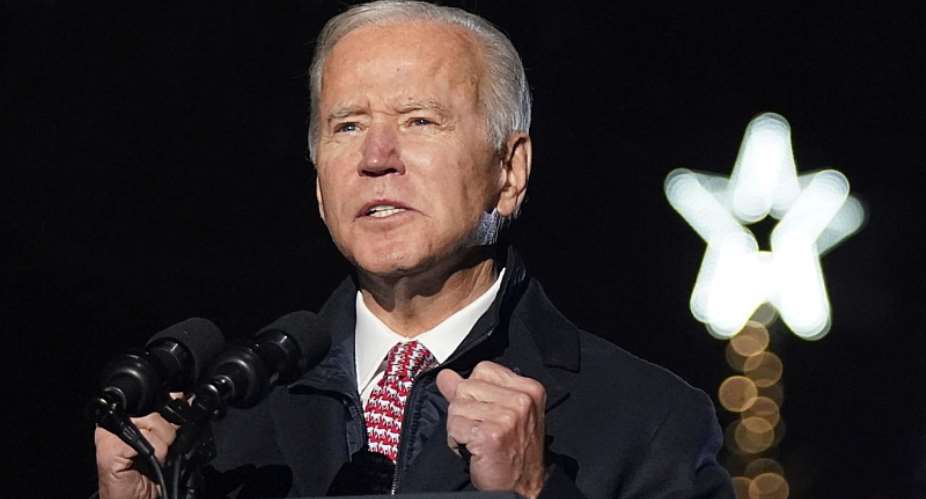Democracy faces "sustained and alarming challenges" worldwide, President Joe Biden said Thursday at the opening of a virtual Summit for Democracy with representatives from some 100 countries.
Biden said trends are "largely pointing in the wrong direction" and that democracy needs "champions."
"We stand at an inflection point," Biden said. "Will we allow the backward slide of rights and democracy to continue unchecked?"
The two-day event, held by video link because of the coronavirus pandemic, was billed by the White House as US leadership in an existential struggle between democracies and powerful autocracies or dictatorships.
Democratic reckoning
"Make no mistake, we're at a moment of democratic reckoning," said Uzra Zeya, the Under Secretary of State for Civilian Security, Democracy, and Human Rights. "Countries in virtually every region of the world have experienced degrees of democratic backsliding."
The summit featured opening remarks from Biden and Secretary of State Antony Blinken, with representatives from some 100 governments, as well as NGOs, private businesses, philanthropical organisations and legislatures attending.
French President Emmanuel Macron was among 48 presidents and heads of governments who gave a short, televised speech at the opening session of the summit on Thursday morning, where he stressed the importance of democracy in dealing with the Covid-19 pandemic, where the system's "resilience" guaranteed vaccination for all.
But Biden went into the summit with the United States deep in its own democratic troubles.
His Republican predecessor Donald Trump continues a campaign to disrupt US political norms and overturn the 2020 election in which he was defeated by Biden.
And there was also tension simply over who should be on – and off – the list of invitees.
China and Russia left out
China and Russia, which Biden sees as champions of authoritarianism, were pointedly left out – stoking, they say, an ideological rift.
"No country has the right to judge the world's vast and varied political landscape by a single yardstick," wrote ambassadors Anatoly Antonov of Russia and Qin Gang of China in a joint essay in The National Interest last month.
Deciding which other countries should be excluded from the summit for human rights abuses or vote rigging was also fraught.
Pakistan and the Philippines were invited, while EU member Hungary's nationalist government was not. Brazil's right-wing President Jair Bolsonaro was invited, while the leader of NATO member Turkey, Recep Tayyip Erdogan, was shunned.
Pakistan declined the invitation.
Spreading lies about fraud
The most awkward element to the summit, however, was the fact that Biden is struggling to restore faith in democracy at home, not only on the other side of the world.
Former Republican president Donald Trump refuses to recognise the results of the 2020 election.
With the help of sympathetic media outlets, including the powerful Fox News,Trump continues to spread lies about fraud to his tens of millions of supporters.
And with shockwaves from the 6 January storming of Congress by Trump supporters still reverberating, there are growing fears over the 2022 legislative elections and the 2024 presidential vote in which Trump may seek a comeback.
The summit was "never a good idea" said Bruce Jentleson, a political scientist at Duke University.
"Our problems here are much worse than in any other Western democracy. We had our Capitol building attacked, an attempted coup. We haven't seen that happen in Paris, or at the Bundestag, or at the EU headquarters in Brussels," he said.
"If we want to compete, we've got to do our best and that is really more up to us within the country than somehow getting 100 leaders together and saying, 'We like democracy'."
(with agencies)





 Election 2024: Power outages will affect NPP – Political scientist
Election 2024: Power outages will affect NPP – Political scientist
 NPP is 'a laughing stock' for luring 'poster-stickers', 'noisemaking babies' wit...
NPP is 'a laughing stock' for luring 'poster-stickers', 'noisemaking babies' wit...
 Dumsor: Matthew Opoku Prempeh must be removed over power crisis – IES
Dumsor: Matthew Opoku Prempeh must be removed over power crisis – IES
 PAC orders WA East DCE to process requests from their MP
PAC orders WA East DCE to process requests from their MP
 Defectors who ditched Alan’s Movement to rejoin NPP were financially induced – A...
Defectors who ditched Alan’s Movement to rejoin NPP were financially induced – A...
 Dumsor: Akufo-Addo has taken Ghanaians for granted, let’s organise a vigil – Yvo...
Dumsor: Akufo-Addo has taken Ghanaians for granted, let’s organise a vigil – Yvo...
 April 23: Cedi sells at GHS13.66 to $1, GHS13.07 on BoG interbank
April 23: Cedi sells at GHS13.66 to $1, GHS13.07 on BoG interbank
 GRA clarifies tax status of resident individuals earning income abroad
GRA clarifies tax status of resident individuals earning income abroad
 2024 elections: NDC to officially unveil Jane Opoku-Agyemang as running mate tom...
2024 elections: NDC to officially unveil Jane Opoku-Agyemang as running mate tom...
 Bawumia embarks on working visit to Italy and the Vatican to boost bilateral tie...
Bawumia embarks on working visit to Italy and the Vatican to boost bilateral tie...
